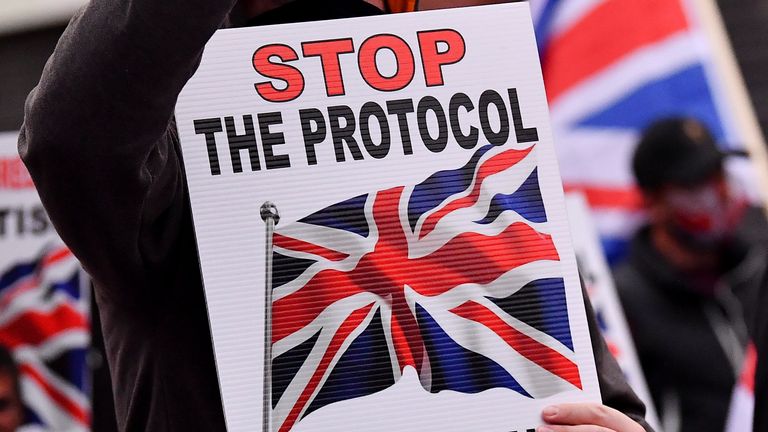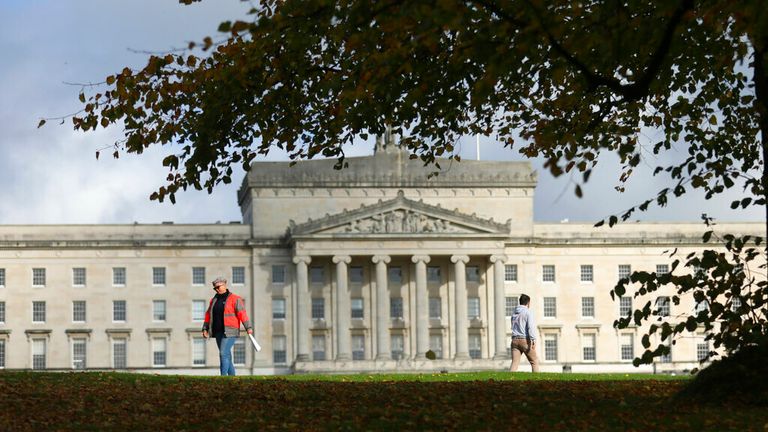[ad_1]
The leader of Sinn Fein has admitted to Sky News that the Northern Ireland Protocol as it stands is causing problems for businesses.
Speaking on Sky News’ Beth Rigby interviews programme, the party’s president Mary Lou McDonald said “the fact that Brexit has thrown up this blizzard of paper, in some instances, is problematic”.
Ms McDonald also said that the UK’s proposal to “legislate to break the law” is “an extremely dangerous place to go” and that she “absolutely” believes a border poll – a referendum on unification – will take place within the next decade.
Politics Hub: PM escapes partygate fine
Earlier this week, Foreign Secretary Liz Truss outlined plans to change the protocol.
She told the Commons the UK faces a “very grave and serious situation” and that without the UK government resolving problems caused by the Northern Ireland Protocol, the Stormont power-sharing executive will not be able to be re-established.
Britain says it does not want to scrap the arrangement and would prefer to come to a negotiated settlement with the EU, but says elements within it must be fixed and it would continue talks.
But Sinn Fein, which became the first nationalist party to win the most seats in the Northern Ireland Assembly in its 101-year history earlier this month, said the legislation proposal would break international law.
Sinn Fein has accused the UK government of coordinating with “obstructionist tactics” by its political opponents in the DUP who are unhappy with the protocol, which governs Northern Ireland’s post-Brexit trading arrangements.
Speaking to Sky News’ political editor Beth Rigby, Ms McDonald said: “I think the decision by the British government to step outside of international, in fact worse than that, to legislate to break the law is an extremely dangerous place to go.
“I think it demonstrates really bad faith, in fact, I think it amplifies the kind of bad faith that we’ve seen from Boris Johnson’s government since Brexit and it certainly does nothing, let me repeat, does nothing to assist in the very necessary goal of urgently and immediately establishing an executive government in the North of Ireland.”
Analysis: What is the government doing about the protocol? The answer seems to be nothing anytime soon
Asked whether she acknowledges why the DUP feels aggrieved, Ms McDonald continued: “Well, let me deal with each of those issues in turn – the deli owner, the paperwork, the fact that Brexit has thrown up this blizzard of paper in some instances, is problematic, I acknowledge that.
“As was the issue, for example, around medicines and any question mark over people’s ability to access the medicines that were required.
“The medicines issue got sorted out before Christmas. On the issue of the paper burden, there is a proposal from the European Commission on the table, that’s what needs to be examined.”
The DUP wants to see the issues with the protocol resolved before they enter into a power-sharing administration – and the party’s leader Sir Jeffrey Donaldson said after his meeting with the PM earlier this week that it needed to see decisive action.
The protocol, an arrangement designed to avoid a hard border between Northern Ireland and the Republic of Ireland, means that some goods imported into Northern Ireland from Great Britain are subject to customs checks, effectively creating a new border in the Irish Sea.
Read more:
What is power-sharing and why does Northern Ireland use it?
What is the Northern Ireland Protocol and why does it matter?
Ms McDonald also told Beth Rigby that “it is the job of both governments” to allow the Irish people to “form and decide” their future together.
“Absolutely, without a shadow of a doubt, I believe that we will see constitutional change in the course probably of the next decade, of that there is no doubt, and we need to prepare for that and the appetite for change across Ireland would really lift your heart, the opportunity that exists for our country, and we need to bring our Unionist brothers and sisters along that road with us,” she said.
Ms McDonald added that her party “need an indication from the British government as to how they might measure when they would regard it to be appropriate or the time for a border poll to happen”.
Britain has been warned that unilaterally pulling out of the protocol could put at risk the wider free trade deal between the UK and Europe, raising the prospect of a trade war.
European Commission vice president Maros Sefcovic said the plan for legislation was “not acceptable” and that Brussels would respond with all measures at its disposal.
Ireland’s foreign minister Simon Coveney said the unilateral action was “damaging to trust and will serve only to make it more challenging to find solutions to the genuine concerns that people in Northern Ireland have about how the protocol is being implemented”.
Meanwhile, speaking to journalists in Westminster, the European Union’s ambassador to the UK warned that Brussels will not change its mandate and reopen negotiations on the Northern Ireland Protocol after Ms Truss urged the EU to change its mandate so that the protocol can be fundamentally rewritten.
“We were told that we should get a new mandate but I can tell you very clearly what the member states are telling us is very simple: You don’t need a mandate and even if you ask for one, you will not get it,” Joao Vale de Almeida said.
Beth Rigby Interviews is live at 9pm every Thursday on Sky News.
[ad_2]



